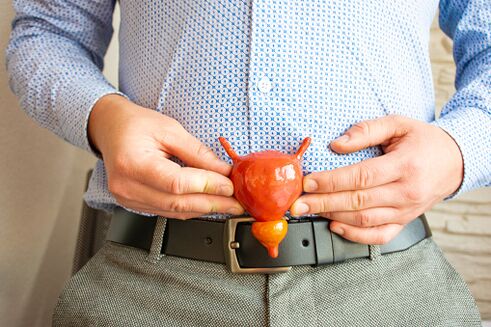Prostatitis is not the most pleasant disease, which often becomes chronic. Any provocation from the side of behavior, well-being and symptoms return: pain in the genital area, painful urination, unstable erection.

The first prevention of prostatitis is a simple and healthy lifestyle without any special prohibitions. Secondary prevention of the onset of the disease consists of a number of measures, including diet, complete rejection of alcohol and, of course, appropriate drugs.
What are the risk factors for the onset of the disease?
Prostatitis can develop with a combination of two factors: the appearance of infection and stagnant processes in the body.
The main sources of pathogens are:
- the intestines and diseases such as Escherichia coli, Klebsiella, Proteus, etc. ;
- a sexual partner with infectious diseases of the genitourinary system: chlamydia, mycoplasma;
- throat infections, untreated decayed teeth, sore tonsils;
- low physical activity.
All of this individually and as a whole can lead to the development of prostatitis.
Physical activity and prevention of prostatitis
Low physical activity is the main reason for the development of prostatitis in adults and young men. Prostatitis against the background of venous stasis in the pelvic organs is called congestive.
If a man leads a healthy and active lifestyle, his muscles in the pelvic region are constantly in good shape. They sufficiently support the genitals in the right position and the whole system works well.
No time for a gym and special classes? This is not a problem! Quite simple, but regular exercise and gymnastics every day. Exercises should be performed for at least 15-30 minutes until sweating begins to appear, that is, until there is light physical activity.
Kegel exercises are suitable for warming up to prevent prostatitis. However, it should be known that they cannot be performed if there are kidney stones present.Prevention of prostatitis at home In addition, for the prevention of prostatitis, light and brisk walking uphill is also suitable, swimming and jogging are ideal.
With the right seat, a bike will also do. It improves blood circulation in the pelvic organs. Biking 5-7 kilometers 2-3 times a week can be a great prevention for prostatitis.
Regular sex plays an important role in preventing prostatitis. Sex should not be "for the show", but against a background of desire and mutual satisfaction. Bad orgasms are not the way to keep the prostate in good shape. The excitement must be real and the hormones must be in order, only then the prevention will work one hundred percent.
Separately, it should be said about the hygiene of sexual relations. It is also very important. Many partners who try to diversify their sexual intercourse simply forget about basic hygiene. Unprotected sex often becomes the cause of an infection of the prostate and, as a result, the development of prostatitis.
Good nutrition, regular and high-quality sex, the absence of bad habits - all these together will give good male health and the absence of prostate diseases.
Products for the prevention of prostatitis
Good nutrition and high quality healthy foods will help protect the body from harmful effects. What foods will be particularly useful for protecting against the prostate? Here is just a small list:
- pumpkin seeds. On an empty stomach, you should eat 30 to 40 seeds for at least 7 days in a row. It will be useful to use them with honey or nuts;
- fatty fish rich in omega-3, also seafood;
- healthy herbs: parsley, lettuce, celery, basil;
- nuts.
Of course, nutrition plays a major role in preventing prostatitis and many other male health problems.
Spicy dishes, beer in the evening, nuts and salty crackers with spices cause only new symptoms of the development of the disease. Symptoms of the disease can appear immediately after eating the wrong food. Treatment should then start from the start.
Well, of course, don't forget about regular medical check-ups. After age 40, all men should see a urologist at least once every six months. As well as women should consult a gynecologist. At this age, the risk of developing prostatitis increases.




































